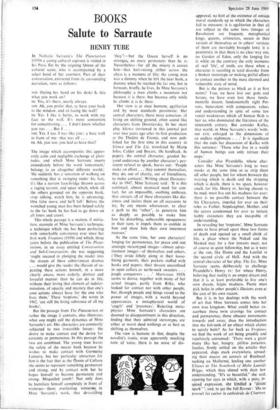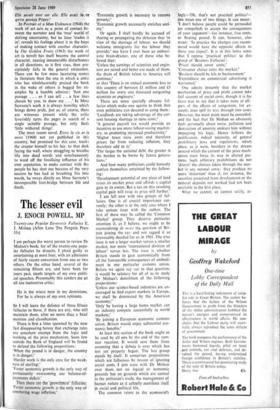Salute to Sarraute BOOKS
HENRY TUBE
In Nathalie Sarraute's The Planetaritan (1959) a young cultural aspirant is visited in his Paris flat by the reigning Queen of the cultural scene, who is accompanied by a select band of her courtiers. Part of their conversation, extracted from its surrounding narration, runs as follows: SHE (laying her hand on his desk) Is this what you work on?
HE Yes, it's there, nearly always.
SHE Ah, you prefer that, to have your back to the window, and sit facing the wall?
HE Yes. I like it better, to work with my face to the wall. Its more convenient for concentrating ... I don't know whether
you too . .. But I .
SHE Yes, I too, I was like you: a bare wall
in front of me—that was all .
HE Ah, you too, you had to have that?
The image which accompanies this appar- ently calm and negligible exchange of plati- tudes, and which Mme Sarraute inserts immediately before the word 'convenient,' belongs to an altogether different world: 'He suddenly has a sensation of walking on something that is swinging under his feet, it's like a narrow foot-bridge thrown across a raging torrent, and upon which, while all the others grouped on the opposite bank, stop talking, watch him, he is advancing. One false move and he'll fall.' Before the wretched young man has been helped safely to the far bank he has had to go down on all fours and crawl.
This whole passage is a mature, if minia- ture, example of Mme Sarraute's technique, a technique which she has been perfecting with remarkable consistency ever since her first work Tropisms (1939) and which, three years before the publication of The Plane- tarium, in an essay entitled Conversation and Sub-Conversation, she was suggesting 'might succeed in plunging the reader into the stream of these subterranean dramas ... would give the reader the illusion of re- peating these actions himself, in a more clearly aware, more orderly, distinct and forceful manner than he can do in life, without their losing that element of indeter- mination, of opacity and mystery that one's own actions always have for the one who lives them.' These 'tropisms,' she wrote in 1962, 'are still the living substance of all my books'.
But the passage from The Planetarium or rather the image it contains, also illustrates what one might call the dynamics of Mme Sarraute's art. Her characters are constantly subjected to two irresistible forces: the desire to make contact and the desire for certainty or permanence. In this passage the two are combined. The young man leaves the safety of the nearer bank because he wishes to make contact with Germaine Lemaire, but her particular attraction for him is the fact that as the elueen of Culture she seems to represent something permanent and strong, and by contact with her he hopes himself to become permanent and strong. Misguided youth! Not only does he humiliate himself completely in front of witnesses—those everlasting witnessiii in Mme Sarraute's work, that devastating `they'!—but the Queen herself is no stronger, no more permanent than he is. Nevertheless—for all the misery it causes him—that hair-raising slither across the abyss is a moment of life; the young man was a dummy when he left the near bank, a dummy when he reached the far one, but in between, briefly, he lives. In Mme Sarraute's philosophy a man climbs a mountain not because it is there, but because only while he climbs it is he there.
Her view is at once humane, egalitarian and by most standards pessimistic. Her central characters, those most conscious of living on shifting ground, often sound like characters from Dostoievsky. In her short play Silence (reviewed in this journal just over two years ago after its first production at the Theatre de France, and now pub- lished for the first time in this country in Silence and The Lie, translated by Maria Jolas, Calder and Boyars, I8s hardback, 8s paper), the central character, goaded be- yond endurance by another character's per- sistent refusal to speak, bursts out: 'People make an effort ... they commit themselves, they do, out of charity, out of friendliness, to make contacts'. Writing about Dostoiev- sky in 1947, Mme Sarraute said: 'It is this continual, almost maniacal need for con- tact, for an impossible, soothing embrace, that attracts all of these characters like diz- ziness and incites them on all occasions to try, by any means whatsoever, to clear a path to the "other", to penetrate him as deeply as possible to make him lose his disturbing, unbearable opaqueness; in their turn, it impels them to confide in him and show him their own innermost recesses.'
At the same time, her own characters' longing for permanence, for peace and rest amongst stereotyped images—almost adver- tisement images—of themselves and others. ('They stride lithely along in their loose- fitting garments, their pockets stuffed with books and papers; their throats unconfined in open collars or turtle-neck sweaters . . .
jungle conquerors . . Martereau, 1953) seems to derive, together with many of her actual images, partly from Rilke, who looked for contact not with other people, but, through people and things raised to the power of images, with a world beyond appearances, a metaphysical world of `angels' and 'presences'. Rejecting meta- physics Mme Sarraute's characters are doomed to disappointment in this direction, finding that their admired stereotypes are either at worst dead nothings or at best as shifting as themselves.
The view is humane in that, despite the novelist's ironic, even apparently mocking tone of voice, there is no sense of dis-
approval, no hint of the existence of outside moral standards up to which the characters fail to measure; it is egalitarian in that all are subject to the same laws (images of Revolution are frequent, metaphorical kings, queens, aristocrats, secure in their version of themselves or in others' versions of them are inevitably brought low); it is pessimistic in that there is no clear way out, no Garden of Eden, only the longing for it, while on the contrary the only moments of real 'life', of truth, are those when a character is recoiling in total disorder from a broken stereotype or making pitiful efforts to contact another in the most alarmed and vulnerable state of mind.
But is the picture as black as it at first seems? True, we have lost our gods and heroes, we have even lost those funda- mentally decent, fundamentally right Per- sons, benevolent with compassion, values and understanding in spite of some few venial weaknesses which all human flesh is heir to, who dominated the literature of the nineteenth century. But consider Kafka, that world, in Mme Sarraute's words 'with- out exit, enlarged to the dimensions of an endless nightmare . . .' It is significant that she ends her discussion of Kafka with this sentence: 'Those who live in a world of human beings can only retrace their steps.'
Consider also Pirandello, whose char- acters like Mme Sarraute's long to wear masks at the same time as to strip them off other people, but for whom between the wearing which is death and the stripping which is death, there is no space, however small, for life. Henry iv, having chosen to be mad, must live out his madness for ever; there is no possible contact between the Six Characters, impaled for ever on their roles as Father, Stepdaughter, Mother, and the actors condemned for ever to imitate feebly existences they are incapable of understanding.
In revealing her 'tropisms', Mme Sarraute seems to have prised apart these two forms of death and opened up a small chink of life, a place where the Naked and the Masked may for a few instants meet, not of course in quiet fellowship, but as it were at the run, like Dante and the Lustful in the second circle of Hell. And with the central character of her play, The Lie, Mme Sarraute seems deliberately to challenge Pirandello's Henry iv; for where Henry, believing that reality is an empty dream and that it is at least preferable to live one's own dream, feigns madness, Pierre must pick holes in other people's illusions even at the cost of his own reason.
But it is in her dealings with the work of art that Mme Sarraute comes into her own true kingdom. What could better ex- acerbate those twin cravings for contact and permanence, those obscure movements towards and away, than the introduction into the fish-tank of an object which claims to satisfy both? As far back as Tropisms we find the work of art being greedily and repulsively consumed: 'There were a great many like her, hungry, pitiless parasites, leeches, firmly settled on the articles that appeared, slugs stuck everywhere, spread- ing their mucus on corners of Rimbaud, sucking on Mallarme, lending one another Ulysses or The Notebook of Matte Laurids Brigge, which they slimed with their low understanding. "it's so beautiful," she said, opening her eyes in which, with a pure, in- spired expression, she kindled a "divine spark" '; and, to get the full flavour: 'On ne pouvait lei cacher la cathedrale de Chartres.
Elle savait tout sur elle. Elle avail lu ce qu'en pensait Piguy.'
In Portrait of a Man Unknown (1948) the work of art acts as a point of contact be- tween the narrator and the 'true' world of shifting uncertainty, but he later 'trades it in', reveals his feelings about it in the hope of making contact with another character. In The Golden Fruits (1963) the work of art (a novel) has itself become the central character, causing innumerable disturbances in all directions, as it first rises, then pre- cipitately falls in the general estimation. There can be few more lacerating scenes in literature than the one in which a critic who has wholeheartedly praised the book in the wake of others is begged for ex- amples by a humble admirer: 'Just one passage . . . so I can tell . . a few lines chosen by you, to show me . . In Mme Sarraute's work it is always humility which brings down pride, just as, of course, there are witnesses present while the critic feverishly turns the pages in search of a single suitable passage, but only finds `little withered things'.
The most recent novel, Entre la vie et, la mort `(1968) not yet published in this country, but promised for this year, tracks the creator himself to his lair, to that desk facing the wall, where struggling to breathe life into dead words and simultaneously to ward off the fossilising influence of his own reputation, to make contact with the people he has shut out because of the very success he has had in breathing life into words, he sways dizzily on Mme Sarraute's incomparable foot-bridge between life and death.



































 Previous page
Previous page